VIPsight - July 2011
COMPANIES
Gerry Weber replaces Tognum
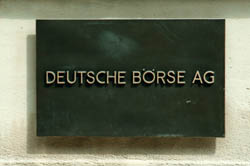 The Deutsche Börse has announced that the Gerry Weber share is again listed in the MDAX as of 29 June, after eight years of absence. As a reason for changing,the exchange operator stated on 27 June that the free float of Tognum had fallen below the required threshold of ten percent after the takeover by Daimler and Rolls-Royce, so the engine manufacturer’s stock had been removed from the index. The return to the stock exchange’s second league has been a strategic goal of the fashion group for a year. The market value finished at rank 48 on the index list, keeping other MDAX aspirants like Deutz or Jungheinrich at bay.
The Deutsche Börse has announced that the Gerry Weber share is again listed in the MDAX as of 29 June, after eight years of absence. As a reason for changing,the exchange operator stated on 27 June that the free float of Tognum had fallen below the required threshold of ten percent after the takeover by Daimler and Rolls-Royce, so the engine manufacturer’s stock had been removed from the index. The return to the stock exchange’s second league has been a strategic goal of the fashion group for a year. The market value finished at rank 48 on the index list, keeping other MDAX aspirants like Deutz or Jungheinrich at bay.
 VW apparently collects more than a 50 percent stake in MAN
VW apparently collects more than a 50 percent stake in MAN
Volkswagen’s mandatory offer for MAN has allegedly been well received. According to Reuters, more shareholders than initially expected had accepted the the Wolfsburg firm’s takeover offer. Both DAX-listed companies declined to comment.
Terex acquires Demag Cranes
Terex has secured the majority for its voluntary takeover offer for Demag Cranes. According to preliminary information, approximately 67 percent of Demag’s shares had been tendered. The Americans had not initially been able to convince Demag investors of their plans. The Board and Supervisory Board gave up their initial resistance only after the competitor had raised its offer price in mid-June from €41,75 by €3.75 per share to €45.50, raising the bid to almost one billion euros. Together with previously purchased shares Terex now holds about 68 percent.
Meyer Burger controlls Roth & Rau
Meyer Burger, after the expiry of the second acceptance period on 28 June, holds 81.89 percent in Roth & Rau. The €22 per share offer persuaded Jürgen Gutekunst too to relinquish his shares. The remaining free float is unattractive, since participation was sufficient to slim down the value of the TECDAX company and exercise effective control. Whether the Saxon solar engineering company is to be taken off the stock exchange by the Swiss solar company is still open. According to analyst estimates the company still has a weak position. A turnaround is expected in the coming months, which should see positive momentum from the collaboration.
Turbulence at Bilfinger
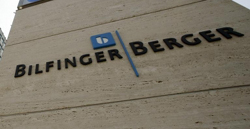 As the news magazine “Der Spiegel” reported, German and U.S. authorities are investigating Julius Berger Nigeria PLC, a 49-percent subsidiary of the MDAX-listed construction group Bilfinger Berger. In order to secure new orders, the company allegedly systematically paid bribes until a few years ago. In America, where the investigations have been running since late 2010, a two-digit million penalty threatens. Already in January this year, U.S. law firm DLA Piper had submitted an internal report to the Board.
As the news magazine “Der Spiegel” reported, German and U.S. authorities are investigating Julius Berger Nigeria PLC, a 49-percent subsidiary of the MDAX-listed construction group Bilfinger Berger. In order to secure new orders, the company allegedly systematically paid bribes until a few years ago. In America, where the investigations have been running since late 2010, a two-digit million penalty threatens. Already in January this year, U.S. law firm DLA Piper had submitted an internal report to the Board.
Schiffsbank takeover must wait
 The government aid Commerzbank received during the financial crisis, in the form of a silent partnership in the amount of €18.2 billion, bars, according to a European Commission requirement, the acquisition of other banks until 30 April 2012, or alternatively until the government aid is repaid. In the wake of the takeover of Dresdner Bank, Commerzbank had, before the crisis, purchased shares in Deutsche Schiffsbank, with the aim of bringing together various shipping-loan portfolios there. After a capital increase at the Hamburg ship financier, the Frankfurt bank had raised its share from 80 to 92 percent in 2009. With Unicredit, Commerzbank is now negotiating the acquisition of the outstanding eight percent. In early June, Commerzbank carried out a capital increase to make the repayment of the government’s silent partnership possible.
The government aid Commerzbank received during the financial crisis, in the form of a silent partnership in the amount of €18.2 billion, bars, according to a European Commission requirement, the acquisition of other banks until 30 April 2012, or alternatively until the government aid is repaid. In the wake of the takeover of Dresdner Bank, Commerzbank had, before the crisis, purchased shares in Deutsche Schiffsbank, with the aim of bringing together various shipping-loan portfolios there. After a capital increase at the Hamburg ship financier, the Frankfurt bank had raised its share from 80 to 92 percent in 2009. With Unicredit, Commerzbank is now negotiating the acquisition of the outstanding eight percent. In early June, Commerzbank carried out a capital increase to make the repayment of the government’s silent partnership possible.
Heideldruck has new statute
At the AGM on 28 July shareholders should approve the change of business purpose. By now, the business beyond the print area constitutes so large a proportion of total business that the company wants in future to list other products and services and consulting services in the area of mechanical engineering, electronics and electrical engineering as well as in the metal industry as objects of business.
Oman checks Hapag’s books
 According to Financial Times Deutschland, the Omani State fund has sent TUI a letter of intent making known the Arabs’ intentions to purchase parts of the shipping subsidiary Hapag Lloyd. Accordingly, the Oman Investment Fund is currently checking the books of the Hamburg shipping company and wants to buy TUI’s shares. Also interested is the Chinese conglomerate HNA, which seeks a majority stake in Hapag-Lloyd. The majority shareholder, the Albert Ballin consortium, wants, however, to secure the site in Hamburg. TUI now puts its 38.4 percent stake in the shipping company at a value of €1.1 billion.
According to Financial Times Deutschland, the Omani State fund has sent TUI a letter of intent making known the Arabs’ intentions to purchase parts of the shipping subsidiary Hapag Lloyd. Accordingly, the Oman Investment Fund is currently checking the books of the Hamburg shipping company and wants to buy TUI’s shares. Also interested is the Chinese conglomerate HNA, which seeks a majority stake in Hapag-Lloyd. The majority shareholder, the Albert Ballin consortium, wants, however, to secure the site in Hamburg. TUI now puts its 38.4 percent stake in the shipping company at a value of €1.1 billion.
Buhlmann's Corner
Black Forest gâteau à la Piëch
 Hooray, the German Corporate Governance Code has turned 10 and hardly anyone has insulted it. Even the extraneous woman debate, as connected with corporate governance as a car is with traffic lights, hasn’t harmed the Code, now led by Klaus-Peter Mueller after Gerhard Cromme, any more than did the near-collapse of Commerzbank. What reason was there for celebrating the birthday recently in such a small group? Was it fear that otherwise the Minister of Justice would appoint a second female Commissioner? She has done so anyway, in virtue of some unknown power. Had it to do with the snap decision by the old Chancellor to hide the legal force of the Code so indirectly in §161 AktG that I was already then writing about a wolf in sheep’s clothing? Or it was the first president who “accidentally” smuggled the second board member more presentably into the Code, because he needed him at home?
Hooray, the German Corporate Governance Code has turned 10 and hardly anyone has insulted it. Even the extraneous woman debate, as connected with corporate governance as a car is with traffic lights, hasn’t harmed the Code, now led by Klaus-Peter Mueller after Gerhard Cromme, any more than did the near-collapse of Commerzbank. What reason was there for celebrating the birthday recently in such a small group? Was it fear that otherwise the Minister of Justice would appoint a second female Commissioner? She has done so anyway, in virtue of some unknown power. Had it to do with the snap decision by the old Chancellor to hide the legal force of the Code so indirectly in §161 AktG that I was already then writing about a wolf in sheep’s clothing? Or it was the first president who “accidentally” smuggled the second board member more presentably into the Code, because he needed him at home?
It’s all much simpler! Whoever sits on the Code Committee may go bankrupt, or cash in like there’s no tomorrow. He can toil away like Christian Strenger, or just sit back and look the other way when the Code is being abused – or nationalized. Membership is conferred as an act of grace, not acquired meritocratically. The real power lies in the back office. It’s there the board acts, the true power and stabilizer of the system. Those who survive everything, the German way. They are the Dr. Thomas Kremers of our times, who carefully apportion the work, get on with it, and are not too proud do to some donkey work on the governance awkward squad. It certainly takes considerable compensation for pain and suffering to be a deputy Supervisory Board member under Ferdinand Piëch, as a Code chairman.
Our Austrian Ferdinand hoped to fill more than half of the Supervisory Board’s capital side, with only a little over 30 percent of the votes (with the shareholders at the AGM unsuspecting). This could have backfired. Charmingly and very much the gentleman, he told the EU antitrust that an identical cast of VW directors at Scania and MAN might be “a little” within their province. With the casual reference, a spontaneous motion was submitted to the AGM, making the electronic votes ineffective. As if by magic, the power of the commander and Supervisory Board chief grew so much that there was no doubt about who would be appointed.
The Infineon model has been copied and is now used not just at DAX AGMs. Mix, modify and re-count – what didn’t fit is retouched. That’s German corporate governance. Piëch has understood it. Grinning in front of the owners, he keeps to a rule to move only 70-year-olds to the Supervisory Board, because after all he has 74 years of experience. When will the institutionals understand? Give them another 10 years – a promise if, God willing, I’m still here.
ACTIONS CORNER
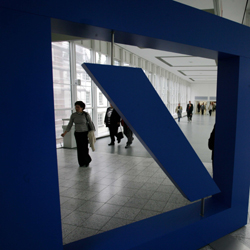 Rolf E. Breuer must stand trial from 18 August in a criminal case for attempted perjury before the Munich district court, prosecutors said on 20 June. Initially, four dates are scheduled. The prosecution alleges that the former Deutsche Bank chief made deliberately untruthful statements in 2003 about the background to a TV interview, in a civil case for compensation for Leo Kirch’s multibillion bankruptcy. The charges were brought by prosecutors in November 2009, but the trial has been long delayed for further investigations.
Rolf E. Breuer must stand trial from 18 August in a criminal case for attempted perjury before the Munich district court, prosecutors said on 20 June. Initially, four dates are scheduled. The prosecution alleges that the former Deutsche Bank chief made deliberately untruthful statements in 2003 about the background to a TV interview, in a civil case for compensation for Leo Kirch’s multibillion bankruptcy. The charges were brought by prosecutors in November 2009, but the trial has been long delayed for further investigations.
The special dividend announced on 7 June by Deutsche Börse and NYSE EuroNext of a total of $900 million (around €631 million) has pacified recalcitrant shareholders, paving the way for the merger. The exchange operators want to pay an extraordinary dividend of two euros per Deutsche Börse share and $1.37 per NYSE EuroNext share, once the merger into the world’s largest exchange company has been completed. The dividend has, according to court documents, helped to settle a dispute before a court in the U.S. State of Delaware.
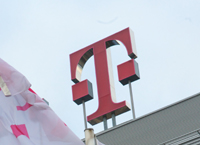 The Federal Court of Justice (BGH) has upheld a complaint by Deutsche Telekom against government and KfW. The state development bank must according to the decision immediately pay the Bonn-based company 95 million euros. Thus the major shareholder takes prospectus liability for Telekom’s “third public offering” in June 2000. Deutsche Telekom had claimed back from KfW and the federal government the legal fees for a $112.5 million settlement reached in the U.S. in 2005. Still unclear are the demand for the remaining $17.5 million and the federal government’s obligation to pay expenses.
The Federal Court of Justice (BGH) has upheld a complaint by Deutsche Telekom against government and KfW. The state development bank must according to the decision immediately pay the Bonn-based company 95 million euros. Thus the major shareholder takes prospectus liability for Telekom’s “third public offering” in June 2000. Deutsche Telekom had claimed back from KfW and the federal government the legal fees for a $112.5 million settlement reached in the U.S. in 2005. Still unclear are the demand for the remaining $17.5 million and the federal government’s obligation to pay expenses.
Deutsche Telekom must pay Telegate €41.28 million. The years of litigation between the directory assistance company (klicktel.de and 11880) and Deutsche Telekom were about abusive excessive prices for the transfer of address data from the Telekom subscriber list to the company in Planegg. Telekom as a dominant company had hampered Telegate from 1997 to 2001, the Düsseldorf Higher Regional Court ruled on 8 June. Already in April the court had twice ruled in favour of Telegate and sentenced Telekom to multimillion dollar payments.
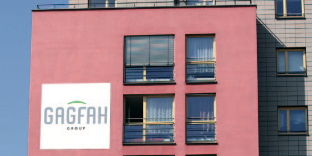 Gagfah is defending itself against a lawsuit by the city of Dresden, alleging breach of contract, with several counterclaims against the municipality and against city financial chief Hartmut Vorjohann personally, said the residential property company. In early May Gagfah had dismissed Vorjohann from the Supervisory Board. The WOBA companies, shielded by the real-estate group or Gagfah itself, also want to examine whether they are entitled to compensation because of the city’s lawsuits. Dresden’s claims for 1.1 billion euros plus interest are directed exclusively against WOBA companies.
Gagfah is defending itself against a lawsuit by the city of Dresden, alleging breach of contract, with several counterclaims against the municipality and against city financial chief Hartmut Vorjohann personally, said the residential property company. In early May Gagfah had dismissed Vorjohann from the Supervisory Board. The WOBA companies, shielded by the real-estate group or Gagfah itself, also want to examine whether they are entitled to compensation because of the city’s lawsuits. Dresden’s claims for 1.1 billion euros plus interest are directed exclusively against WOBA companies.
Ferrostaal is to pay a €177 million penalty for payments in connection with its multibillion submarine transactions with Greece and Portugal. The Munich prosecutors’ office has negotiated the sum with the lawyers of the Essen group and the court. It is well below its last claim, for 277 million euros. The MAN subsidiary did not want to comment; nor did the prosecutors. The truck manufacturer and State fund IPIC have not yet agreed on who is to pay for the consequences of the affair, which became known only after the takeover of IPIC.
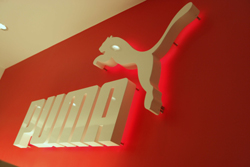 PUMA has been spared payments of up to 98 million euros to Estudio 2000 in a legal dispute over the transfer of the Spanish trademark rights. Madrid district court on 14 June – as requested – overturned the contrary arbitration ruling of 2 June 2010, for a procedural error. The ruling had awarded the Franconians’ former licensees the sum as the price for buying back the trademark rights in Spain. Jochen Zeitz said he had expected such a verdict. The sporting-goods company will now consider all available options to secure all PUMA trademark rights in Spain.
PUMA has been spared payments of up to 98 million euros to Estudio 2000 in a legal dispute over the transfer of the Spanish trademark rights. Madrid district court on 14 June – as requested – overturned the contrary arbitration ruling of 2 June 2010, for a procedural error. The ruling had awarded the Franconians’ former licensees the sum as the price for buying back the trademark rights in Spain. Jochen Zeitz said he had expected such a verdict. The sporting-goods company will now consider all available options to secure all PUMA trademark rights in Spain.
The Munich prosecutors’ office has again brought charges against a former Siemens board member because of the bribery scandal. Uriel Sharef is the second group executive who has had to answer charges of bribery in court. According to the investigations, he was enmeshed in a system of slush funds and kickbacks in the awarding of a contract in Argentina.
AGM Dates
| Company | Event | Date | Time | Place | Address | Published on |
| MDAX | ||||||
| Südzucker AG | ord. AGM | 21.07.2011 | 10:00 | 68161 Mannheim | Congress Center Rosengarten | 20.05.2011 |
| The Agenda for the ordinary AGM of Südzucker AG starts with the usual items, like presentation of annual accounts and discharge to the company bodies. Südzucker AG earned balance-sheet profits of €104.15m last business year, which is to be paid out as dividend. A small amount of €4,100 is to be carried forward to a new account. A new election of one member to the Supervisory Board is to be held. A resolution is also to be taken on assent to a company agreement between Südzucker Aktiengesellschaft Mannheim/Ochsenfurt and Hellma Gastronomie-Service GmbH. | ||||||
| Heidelberger Druckmaschinen AG | ord. AGM | 28.07.2011 | 10:00 | 68161 Mannheim | Rosengartenplatz 2, Congress Center | 16.06.2011 |
| The Agenda for the ordinary AGM of Heidelberger Druckmaschinen AG starts with the usual items, like presentation of annual accounts and discharge to the company bodies. New elections to the Supervisory Board are to be held. The existing Authorized Capital is to be replaced by a new one of €119.93m. Additionally, several charter amendments are to be decided. | ||||||
| TecDAX | ||||||
| Phoenix Solar AG | ord. AGM | 14.07.2011 | 11:00 | 82256 Fürstenfeldbruck | Fürstenfeld 12, Veranstaltungsforum | 27.05.2011 |
| The Agenda for the ordinary AGM of Phoenix Solar AG starts with the usual items, like presentation of annual accounts and discharge to the company bodies. Phoenix Solar AG earned balance-sheet profits of €64.05m last business year. Of the profits, €2.58m is to be paid out as dividend and €61.47m carried forward to a new account. A resolution approving the remuneration system for board members is to be taken. The existing Authorized Capital is to be replaced by a new one of €3.69m. Supervisory Board pay is to be adjusted. | ||||||
Politics
BaFin criticizes banks
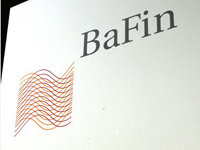 The Bonn-based Federal Financial Supervisory Authority (BaFin) has given several German banks a bad grade in terms of risk spreading, reports Financial Times Deutschland (FTD). With a mark of “four”, the banks had just avoided sanctions, i.e. fines. The names of the banks concerned were not disclosed. The supervisory authority had required one bank to correct the defects within three months. If this were not done, it would have to hold more equity. Since last December, the banks have been obliged to consider whether new risks have been added to their portfolio and how big the scope for new business is.
The Bonn-based Federal Financial Supervisory Authority (BaFin) has given several German banks a bad grade in terms of risk spreading, reports Financial Times Deutschland (FTD). With a mark of “four”, the banks had just avoided sanctions, i.e. fines. The names of the banks concerned were not disclosed. The supervisory authority had required one bank to correct the defects within three months. If this were not done, it would have to hold more equity. Since last December, the banks have been obliged to consider whether new risks have been added to their portfolio and how big the scope for new business is.
Bank levy still controversial
 In mid-June, the Bundesrat voted on details of the new bank levy. Until recently it was controversial whether the small credit unions and savings banks should participate in the levy. The Länder finance ministers had agreed in advance of the vote that banks with relevant liability under €500 million should be exempted from the levy. The maximum charge in this context was raised from 15 percent to 18 percent of average earnings for the previous five years. To prevent big banks from accounting themselves as poor, losing years are to be zero weighted. The funds accruing, an estimated one billion euros a year, will flow into a crisis fund, from which wrecked financial institutions are to be supported in the future. The state of Hesse wants to eliminate the exemption and has raised constitutional concerns about the minimum threshold for small institutions. The allowance also meets resistance from the Federal Finance and Justice ministries.
In mid-June, the Bundesrat voted on details of the new bank levy. Until recently it was controversial whether the small credit unions and savings banks should participate in the levy. The Länder finance ministers had agreed in advance of the vote that banks with relevant liability under €500 million should be exempted from the levy. The maximum charge in this context was raised from 15 percent to 18 percent of average earnings for the previous five years. To prevent big banks from accounting themselves as poor, losing years are to be zero weighted. The funds accruing, an estimated one billion euros a year, will flow into a crisis fund, from which wrecked financial institutions are to be supported in the future. The state of Hesse wants to eliminate the exemption and has raised constitutional concerns about the minimum threshold for small institutions. The allowance also meets resistance from the Federal Finance and Justice ministries.
Higher capital ratios in Basel III
The Basel Committee agreed in late June on higher capital ratios for big banks. In addition to the hard core capital ratio (Tier I) already agreed under Basel III regulations of seven percent, large banks should therefore hold a risk buffer of from 1.0 to 2.5 percentage points. Only issued shares and retained earnings are counted towards core capital here. These are placed in relation to risky assets. The criteria for the definition of a major bank are the amount of total assets, global networking in the financial system and outstanding loan obligations. While Commerzbank could get off with a buffer of 1.0 percent, analysts estimate that the German bank must as a so-called Sifi (Systemically Important Financial Institution) hold up to 2.5 percent in capital buffers. In mid July the Financial Stability Board (FSB) is to identify the system-relevant banks, to which the regulation will apply. A list of up to 30 institutions is expected, of which the eight most important ones, including Deutsche Bank, are to hold a risk buffer of 2.5 percent. France advocates a longer list. A final decision will be made at the G20 summit in Cannes in early November. The more stringent capital requirements will according to Mediobanca analysts in London mean that the seven largest European banks, including Deutsche Bank, Unicredit, BNP Paribas, Société Générale, Banco Santander and Credit Suisse, will have to increase their equity capital. Mediobanca estimates the volume of the increases at €62 billion. The need at Deutsche Bank alone is estimated to be 3.5 billion euros. While the financial industry has time until 2019 to meet the capital requirements, investors expect the requirements to be already fully met from 2013, the date of the gradual introduction of the regulations.
Insurers fight Solvency II
EU Internal Market Commissioner Michel Barnier is fighting against the concerns of the European insurance sector about the new Solvency II rules. These provide for new capital and oversight rules for the insurance industry. Basically, those insurance companies that have equity investments and thus higher risks should hold even more capital. The industry criticizes the new rules as too complex and calls for an acclimatization period, while the requirements are monitored but not sanctioned. Barnier, however, decided the rules should enter into force punctually on 1 January 2013. The EU Commission could at most create transitional rules. The Executive Director of European insurance oversight body EIOPA, Carlos Montalvo Rebuelta, has advocated such a transitional rule at a conference.
New bank stress testing controversy
 The head of the European Banking Authority EBA established at the beginning of the year, Andrea Andria, is standing in the crossfire. On the one hand, the banking associations complain the recently applied criteria for credit institutions’ stress resistance are exaggerated. Analysts, on the other hand, warn that the stress test on the banks may again be too lax and so set the credibility of the authority at stake. The EBA is currently testing 91 European banks for their vulnerability to crisis. In addition to a Europe-wide recession, a slump in the housing and stock markets and a sharp rise in interest rates are being simulated. If a bank’s core capital ratio falls below five percent in the test, it is considered failed and the bank needs to raise new capital. According to Reuters, rumours have it that around 15 banks, if possible from several different countries, are to fail the test, to make it more credible and effective. In the first stress test last year, Irish banks came through the test without difficulty, although they collapsed a short time later. Among the 91 banks tested, 14 are German, of which Helaba and Nord/LB are regarded as shaky candidates. A result of the test is expected in mid July. The head of the Federal Financial Supervisory Authority (BaFin), Jochen Sanio, criticized the stress test criteria applied as too harsh, and even accused the EBA of breaking the law because it put forward new equity capital definitions without legitimacy. Although Basel III demanded new capital rules only for 2019, the EBA is already asking the banks for five percent hard equity capital. The German banking associations too accused the EBA of technical and logical errors.
The head of the European Banking Authority EBA established at the beginning of the year, Andrea Andria, is standing in the crossfire. On the one hand, the banking associations complain the recently applied criteria for credit institutions’ stress resistance are exaggerated. Analysts, on the other hand, warn that the stress test on the banks may again be too lax and so set the credibility of the authority at stake. The EBA is currently testing 91 European banks for their vulnerability to crisis. In addition to a Europe-wide recession, a slump in the housing and stock markets and a sharp rise in interest rates are being simulated. If a bank’s core capital ratio falls below five percent in the test, it is considered failed and the bank needs to raise new capital. According to Reuters, rumours have it that around 15 banks, if possible from several different countries, are to fail the test, to make it more credible and effective. In the first stress test last year, Irish banks came through the test without difficulty, although they collapsed a short time later. Among the 91 banks tested, 14 are German, of which Helaba and Nord/LB are regarded as shaky candidates. A result of the test is expected in mid July. The head of the Federal Financial Supervisory Authority (BaFin), Jochen Sanio, criticized the stress test criteria applied as too harsh, and even accused the EBA of breaking the law because it put forward new equity capital definitions without legitimacy. Although Basel III demanded new capital rules only for 2019, the EBA is already asking the banks for five percent hard equity capital. The German banking associations too accused the EBA of technical and logical errors.
People
 Markus Pinger’s successor at Beiersdorf is Ralph Gusko, most recently managing director for Northern Europe. The 50-year-old took over Pinger’s brands post at the Hamburg cosmetics group on 1 July. The current brands chief had asked the Supervisory Board to release him early from his contractual obligations, after completing the first phase of realignment initiated by him.
Markus Pinger’s successor at Beiersdorf is Ralph Gusko, most recently managing director for Northern Europe. The 50-year-old took over Pinger’s brands post at the Hamburg cosmetics group on 1 July. The current brands chief had asked the Supervisory Board to release him early from his contractual obligations, after completing the first phase of realignment initiated by him.
The new CEO at Celesio is to be Markus Pinger. On 23 June the Supervisory Board agreed to the appointment of the Beiersdorf brands head. Pinger is a “dream candidate” and “the ideal person at the top.” He will begin his new job in Stuttgart on 15 August. As Fritz Oesterle had resigned in late June, Wolfgang Maehr is acting head for two weeks.
In the “best of mutual agreement”, on 31 July Hans-Joachim Nikolin is leaving the board of Continental, the Hanover-based automotive supplier said on 8 June. The head of truck tires was actually still appointed until May 2014. With effect from 1 August the divisions for car and truck tires would be consolidated. Nikolai Setzer would take over as head.
Hermann T. Dambach, CEO of Oaktree GmbH, resigned his Supervisory Board post at Deutsche Wohnen at the end of June. He announced this on 31 May at the AGM. Through the sale of all its shares, Oaktree ended its commitment to the real-estate company on 31January. By mid-year a successor is to be determined and a new member appointed to the Supervisory Board.
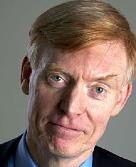 Maarten Henderson was elected as new Supervisory Board chairman at freenet. The former Permira manager took office immediately, replacing Thorsten Kraemer, the wireless provider announced on 1 July. An election was necessary as the former chairman resigned this position following the AGM on 30 June. Henderson has been on the Supervisory Board since 2009.
Maarten Henderson was elected as new Supervisory Board chairman at freenet. The former Permira manager took office immediately, replacing Thorsten Kraemer, the wireless provider announced on 1 July. An election was necessary as the former chairman resigned this position following the AGM on 30 June. Henderson has been on the Supervisory Board since 2009.
Dieter Ammer has resigned as a member of the Supervisory Board of GEA Group “for personal reasons” with effect from 7 July. The former Tchibo CEO and Conergy Supervisory Board member had belonged to the Supervisory Board since 3 June 2003. The Supervisory Board of the machine and plant engineering company noted the decision “with respect and regret,” and thanked the 60-year-old for his years of work.
Heidelberger Druckmaschinen will elect the CEO of SGL Carbon, Robert J. Koehler, as its new Supervisory Board chairman immediately after the AGM on 28 July, as the successor to the 72-year-old Mark Woessner. The current chairman will then resign, and retire from the Supervisory Board due to age as planned. Werner Brandt, a board member at SAP, will also resign his seat on the Supervisory Board of the printing-machine manufacturer, at his own request. As a press release published on 9 June further explained, the nomination committee at its meeting proposed Lone Fønss Schrøder and Herbert Meyer to the next AGM as candidates for election to the Supervisory Board.
Peter Noé left Hochtief for personal reasons in the best of mutual agreement at the end of June, and not as planned on 10 September. Board member Martin Rohr took over responsibility for the company Hochtief AirPort. Noé had made use of his special right of termination in connection with the acquisition of the construction group by ACS.
Paul Thomason will not renew his management contract when it expires on 31 March 2012, for personal reasons, Kabel Deutschland Holding announced on 7 June in Munich after a Supervisory Board meeting. The CFO wants to take on new challenges in his native United States, the report said. The cable-network operator has started the search for a suitable candidate.
Krones has proposed Christoph Klenk (47) as successor to CFO Hans-Jürgen Thaus, retiring having reached the agreed age limit (62). The head of the research and development department should become the new CFO at the end of the year, the Neutraubling bottling-plant builder said on 14 June. Klenk's task on the board is to be taken over as from 2012 by 43-year-old Thomas Ricker. The former president of the University of Regensburg, Prof. Erich Kohnhäuser, retired from the Supervisory Board following the AGM on 15 June. At the shareholder meeting Petra Schadeberg-Herrmann, the first woman on the executive committee in its history, was also elected as managing partner of Krombacher Finance.
 Ferdinand Piëch told shareholders at the owners’ meeting on 27 June that the three representatives he originally planned, Martin Winterkorn, Hans Dieter Pötsch and Jochem Heizmann, cannot take their posts on the MAN Supervisory Board until after merger approval, the EU Commission had indicated. All three also sit on the Supervisory Board of Scania, where the Wolfsburg firm holds 72 percent. Also, shareholder associations SdK, DSW and ISS had strongly criticized the plans in advance. VW had therefore proposed three new candidates in the short term. As replacements Ulf Berkenhagen and Matthias Bruse were called on. Thomas Kremer had already as elected representative taken the place of Heiner Hasford, who according to company information on 16 June had surprisingly resigned his Supervisory Board post the day before, just two weeks before the AGM, without giving any reasons. Piëch's plans to create a new purchasing department on the MAN board, for which according to a 30 May report in Financial Times Deutschland Audi board member Ulf Berkenhagen was intended, are also off the table for now.
Ferdinand Piëch told shareholders at the owners’ meeting on 27 June that the three representatives he originally planned, Martin Winterkorn, Hans Dieter Pötsch and Jochem Heizmann, cannot take their posts on the MAN Supervisory Board until after merger approval, the EU Commission had indicated. All three also sit on the Supervisory Board of Scania, where the Wolfsburg firm holds 72 percent. Also, shareholder associations SdK, DSW and ISS had strongly criticized the plans in advance. VW had therefore proposed three new candidates in the short term. As replacements Ulf Berkenhagen and Matthias Bruse were called on. Thomas Kremer had already as elected representative taken the place of Heiner Hasford, who according to company information on 16 June had surprisingly resigned his Supervisory Board post the day before, just two weeks before the AGM, without giving any reasons. Piëch's plans to create a new purchasing department on the MAN board, for which according to a 30 May report in Financial Times Deutschland Audi board member Ulf Berkenhagen was intended, are also off the table for now.
Roland Lacher left the Supervisory Board of Singulus Technologies at the AGM on 31 May. The new chairman is Wolfhard Leichnitz. Rolf Blessing was also elected as third member. The new deputy chairman is Günter Bachmann.
Campus
Weder di Mauro on the Code Commission
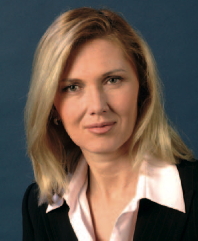 Beatrice Weder di Mauro has since June been a new member of the Government Commission for the German Corporate Governance Code. The professor heads the economic policy department at the Johannes Gutenberg University in Mainz, specializing in international economic relations and financial markets. Since June 2004, Weder di Mauro has been one of the ‘five wise economists’. A native of Switzerland, she is the 13th member of the Commission, and alongside Daniela Weber-Rey, its second woman..
Beatrice Weder di Mauro has since June been a new member of the Government Commission for the German Corporate Governance Code. The professor heads the economic policy department at the Johannes Gutenberg University in Mainz, specializing in international economic relations and financial markets. Since June 2004, Weder di Mauro has been one of the ‘five wise economists’. A native of Switzerland, she is the 13th member of the Commission, and alongside Daniela Weber-Rey, its second woman..
German CFOs on top
The recruitment consultant Michael Page International carried out a survey in March of more than 2,400 chief financial officers in 14 European countries. This revealed that compared to their European neighbours, CFOs in the German-speaking countries on average earn the most. In Portugal, Spain and Sweden, however, the lowest salaries are paid. Thus, more than 80 percent of respondents in the DACH (Germany-Austria-Switzerland) region get annual remuneration including bonuses of more than €120,000. The share of female CFOs is low Europe-wide, and they are also paid less than their male counterparts, says Page. A total of 41 percent of survey respondents earn at least 120,000 euros per year.
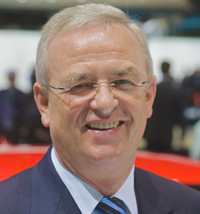 Journalists like Winterkorn
Journalists like Winterkorn
The Dr. Doeblin Association for Business Communication interviewed 55 business journalists in mid-April this year about their image of corporate executives. Far in front is Volkswagen’s chief Martin Winterkorn, followed by Dieter Zetsche of Daimler, Deutsche Bank CEO Josef Ackermann and Norbert Reithofer (BMW).
Trusted forecasts
Kirchhoff Consult, along with shareholder association Deutsche Schutzvereinigung für Wertpapierbesitz, (DSW), took the predictions of the DAX-listed companies under the microscope. Top marks went to Bayer, Deutsche Post DHL, E.on, Fresenius Medical Care, Henkel, Metro and RWE. BASF, Beiersdorf, DaimlerChrysler, HeidelbergCement, Deutsche Lufthansa and Volkswagen figured poorly.
Info portal for supervisory boards
Shareholder association Deutsche Schutzvereinigung für Wertpapierbesitz (DSW), jointly with the University of Cologne and Federal Gazette publisher Bundesanzeiger Verlag, has put a new information portal for German supervisory boards online. At www.adar.info members of the oversight bodies can gain insight into the latest developments in legislation, commentary and current studies. The platform is designed to answer questions on the daily work of supervisory-board members and keep them up-to-date as a network of top-class opinion leaders,.
Social Networking
For financial communication, according to DVFA and Deutsche EuroShop, social media still do not play a big part. According to the joint study, only 45 percent of the analysts and investors surveyed consider social media partly important. However, 71 percent use the web sites of business media as their main source of information. There is scepticism as to the significance and reliability of the information provided on these platforms. The social media most frequently used by the investment professionals were ones like Xing and LinkedIn for public relations.
English fog bombs
 The annual reports of the 30 DAX companies are full of Anglicisms. The Head of the Institute of Accountancy at the University of Saarland, Michael Olbrich, counted an average of 14 English words or phrases on each page of a business report. The leaders in terms of Anglicisms are Deutsche Bank, Siemens and SAP, using an average of more than 20 English words per page. Olbrich speculated in Financial Times Deutschland that “the corporations want to make a few things in the financial reports opaque”.
The annual reports of the 30 DAX companies are full of Anglicisms. The Head of the Institute of Accountancy at the University of Saarland, Michael Olbrich, counted an average of 14 English words or phrases on each page of a business report. The leaders in terms of Anglicisms are Deutsche Bank, Siemens and SAP, using an average of more than 20 English words per page. Olbrich speculated in Financial Times Deutschland that “the corporations want to make a few things in the financial reports opaque”.
Female ratio rises
The proportion of women has made small but visible progress in the current AGM season. More than a third of the 30 DAX companies have filled vacant supervisory board seats with women. Thus, six supervisory-board chairs and 77 more posts on the oversight bodies are held by women. This corresponds to a rate of three and 35 percent respectively. The proportion of women on the capital side of supervisory boards has risen from 4.8 to 10.9 percent in two years. While Fresenius, Fresenius Medical Care, Henkel and Heidelberg Cement are still holding out, the other DAX companies have set themselves specific target quotas. Meanwhile, the state development bank KfW’s SME panel has ascertained that approximately 20 percent of the total 3.7 million SMEs, i.e. 730,000 companies, are run by women. Female-headed small businesses have lower sales growth rates than companies run by men. The Swiss bank Vontobel, meanwhile, together with twelve women-owned businesses, has formed a share pool, the Top Executive Women Basket. This is betting that women take fewer risks than male-run companies.
Capital News
 With its second capital increase with subscription rights, of some 5.3 billion euros, Commerzbank has since April collected a total of eleven billion. The bank has according to its statements issued 2.436 billion new shares with dividend rights from 1 January at a price of €2.18 each. A total of €14.3 billion, consisting of the proceeds of the issue and 3.3 billion own funds, will go to the repayment of state aid amounting to about 16.2 billion euros, which were paid to it during the financial crisis. By 2014, the rest is to be paid off.
With its second capital increase with subscription rights, of some 5.3 billion euros, Commerzbank has since April collected a total of eleven billion. The bank has according to its statements issued 2.436 billion new shares with dividend rights from 1 January at a price of €2.18 each. A total of €14.3 billion, consisting of the proceeds of the issue and 3.3 billion own funds, will go to the repayment of state aid amounting to about 16.2 billion euros, which were paid to it during the financial crisis. By 2014, the rest is to be paid off.
 Fuchs Petrolub is splitting its shares in a one to three ratio. This had been decided at the general meeting of the Mannheim lubricant manufacturer on 11 May. The IPO conversion took place on 30 June. Each common and preferred shareholder received three shares with a nominal share in capital of €1 each in lieu of the existing shares with a nominal value of three euros. By the action the company intends to increase the attractiveness of the shares, in particular to private investors.
Fuchs Petrolub is splitting its shares in a one to three ratio. This had been decided at the general meeting of the Mannheim lubricant manufacturer on 11 May. The IPO conversion took place on 30 June. Each common and preferred shareholder received three shares with a nominal share in capital of €1 each in lieu of the existing shares with a nominal value of three euros. By the action the company intends to increase the attractiveness of the shares, in particular to private investors.
Gerry Weber International has made their paper look cheaper a few days after the rise into the MDAX by a stock split. On 4 July, shareholders received one free share for each of their share certificates, the Westphalian fashion group announced on 29 June in Halle. The number of securities issued thus doubled to 45,905,960. “Our goal in the price adjustment is to make the Gerry Weber share accessible to an even broader spectrum of investors,” said Gerhard Weber. The women's fashion manufacturer had returned from the SDAX to the MDAX after eight years.
Leoni has successfully completed the ten percent capital increase announced on 30 June. By issuing 2,969,000 new shares, €112.8 million accrued to the auto supplier, the company announced on 1 July. The new shares were placed at a price of 38 euros each with institutional investors, under an expedited process. The complete takeover of Daekyung which is to be financed with the proceeds is expected to cost around €25m. In addition, the company intends to use the proceeds to fund organic growth.
MorphoSys has launched a 100,000-share buyback programme. This corresponds to a volume of approximately €1.7m. The shares are to be bought in June on the Exchange and used to implement the long-term compensation programme for the biotech company’s management.
 Singulus Technologies has as planned taken 26 million euros gross in a capital increase announced in late May. The proceeds from the sale of over 7.88 million new ordinary shares are mainly to be used to fund growth in the solar sector and market leadership in the optical disc sector. Due to an additional-subscription option, according to company indications on 20 June the capital increase was significantly oversubscribed, so that additional applications were served at only around 11.89 percent of the subscription volume. In addition, the rest of the money is to be used for special repayments of debt to reduce interest costs.
Singulus Technologies has as planned taken 26 million euros gross in a capital increase announced in late May. The proceeds from the sale of over 7.88 million new ordinary shares are mainly to be used to fund growth in the solar sector and market leadership in the optical disc sector. Due to an additional-subscription option, according to company indications on 20 June the capital increase was significantly oversubscribed, so that additional applications were served at only around 11.89 percent of the subscription volume. In addition, the rest of the money is to be used for special repayments of debt to reduce interest costs.
Director's Dealings
| Company | Person | Function | Buy / Sell | Total value in Euro | Number of shares | Datum |
| AIXTRON | SBG Beteiligung | S | 3.718.694 | 139.604 | 23.-24.05.2011 | |
| COMMERZBANK | Hans Hermann Altenschmidt | SB | Exercising an right | 9.908 | 4.545 | 06.06.2011 |
| COMMERZBANK | Frank Annuscheit | MB | Exercising an right | 27.429 | 12.582 | 06.06.2011 |
| COMMERZBANK | Harriet Annuscheit | Exercising an right | 338 | 155 | 06.06.2011 | |
| COMMERZBANK | Dr. Burckhard Bergmann | SB | Exercising an right | 3.566 | 1.636 | 06.06.2011 |
| COMMERZBANK | Markus Beumer | MB | Exercising an right | 19.446 | 8.920 | 06.06.2011 |
| COMMERZBANK | Martin Blessing | MB-Head | Exercising an right | 204.126 | 93.636 | 06.06.2011 |
| COMMERZBANK | Daniel Hampel | SB | Exercising an right | 4.818 | 2.210 | 06.06.2011 |
| COMMERZBANK | Beate Ursula Hoffmann | SB | Exercising an right | 1.696 | 778 | 06.06.2011 |
| COMMERZBANK | Klaus Hoffmann | Exercising an right | 1.267 | 581 | 06.06.2011 | |
| COMMERZBANK | Dr. Achim Kassow | MB | Exercising an right | 59.455 | 27.273 | 06.06.2011 |
| COMMERZBANK | Jochen Klösges | MB | Exercising an right | 59.056 | 27.090 | 06.06.2011 |
| COMMERZBANK | Klaus-Peter Müller | SB-Head | Exercising an right | 285.384 | 130.910 | 06.06.2011 |
| COMMERZBANK | Michael Reuther | MB | Exercising an right | 21.800 | 10.000 | 06.06.2011 |
| COMMERZBANK | Ulrich Sieber | MB | Exercising an right | 32.700 | 15.000 | 06.06.2011 |
| COMMERZBANK | Dr. Eric Strutz | MB | Exercising an right | 57.321 | 26.294 | 06.06.2011 |
| COMMERZBANK | Sulmana Vermögensverwaltung | Exercising an right | 26.531 | 12.170 | 06.06.2011 | |
| COMMERZBANK | Silke Tschäge | Exercising an right | 1.173 | 538 | 06.06.2011 | |
| COMMERZBANK | Uwe Tschäge | SB | Exercising an right | 2.897 | 1.329 | 06.06.2011 |
| COMMERZBANK | Martin Zielke | MB | Exercising an right | 26.160 | 12.000 | 06.06.2011 |
| Demag Cranes | Burkhard Schuchmann | SB-Head | S | 206.798 | 4.545 | 29.06.2011 |
| Demag Cranes | Aloysius Rauen | MB-Head | S | 225.225 | 4.950 | 27.06.2011 |
| Demag Cranes | Thomas H. Hagen | MB | S | 48.776 | 1.072 | 27.06.2011 |
| DEUTSCHE BANK | Dr. Michael Kröner | S | 290.090 | 7.127 | 25.05.2011 | |
| Deutsche EuroShop | Kreke Immobilien KG | S | 892.813 | 31.250 | 07.06.2011 | |
| Deutsche Post | Prof. Dr. Henning Kagermann | SB | B | 151.237 | 11.900 | 07.06.2011 |
| Deutsche Post | Dr. Stefan Schulte | SB | B | 49.990 | 3.816 | 26.05.2011 |
| Deutsche Telekom | Edward R. Kozel | MB | B | 142.007 | 14.172 | 08.06.2011 |
| Deutsche Telekom | Reinhard Clemens | MB | B | 221.721 | 22.143 | 06.06.2011 |
| Deutsche Telekom | Niek Jan van Damme | MB | B | 181.590 | 17.997 | 06.06.2011 |
| Deutsche Telekom | René Obermann | MB-Head | B | 452.188 | 44.000 | 01.06.2011 |
| Deutsche Telekom | Timotheus Höttges | MB | B | 261.463 | 25.200 | 01.06.2011 |
| Dialog Semiconductor Plc. | Udo Kratz | MB | S | 307.910 | 26.430 | 17.06.2011 |
| Dialog Semiconductor Plc. | Udo Kratz | MB | Exercising an Option | 3.002 | 26.430 | 17.06.2011 |
| Drillisch | Dr. Hartmut Schenk | SB | B | 19.825 | 2.500 | 24.06.2011 |
| FMC | Dr. Emanuele Gatti | MB | Exercising an Option | 1.523.335 | 30.469 | 09.06.2011 |
| FMC | Dr. Bernd Fahrholz | SB | B | 148.539 | 3.000 | 03.06.2011 |
| Fresenius | Dr. Ulf M. Schneider | MB-Head | Exercising an Option | 1.181.449 | 23.856 | 31.05.-01.06.2011 |
| Fresenius | Rainer Baule | MB | Exercising an Option | 905.471 | 21.930 | 23.-31.05.2011 |
| Fresenius | Dr. Gerd Krick | SB-Head | Exercising an Option | 400.282 | 7.740 | 30.05.2011 |
| GERRY WEBER | Doris Strätker | MB | B | 21.175 | 500 | 27.06.2011 |
| GERRY WEBER | R + U Weber | B | 3.667.007 | 83.811 | 14.-20.06.2011 | |
| HeidelbergCement | VEM Vermögensverwaltung | B | 14.804.761 | 313.237 | 23.-26.05.2011 | |
| Henkel | Christoph Henkel | SB | S | 2.375.000 | 50.000 | 21.06.2011 |
| Klöckner & Co | Dr. Hans-Georg Vater | SB | B | 22.650 | 1.429 | 09.06.2011 |
| Klöckner & Co | Gisbert Rühl | MB-Head | rights | 76.800 | 37.500 | 03.06.2011 |
| Klöckner & Co | Gisbert Rühl | MB-Head | Exercising an right | 594.375 | 37.500 | 03.06.2011 |
| Klöckner & Co | Dr. Jochen Melchior | SB | B | 22.650 | 1.429 | 30.05.2011 |
| Klöckner & Co | Ulrich Becker | MB | Exercising an right | 53.811 | 3.395 | 27.05.2011 |
| Kontron | Thomas Sparrvik | MB | B | 75.300 | 10.000 | 08.06.2011 |
| Kontron | Ulrich Gehrmann | MB | B | 37.450 | 5.000 | 08.06.2011 |
| KRONES | Nora Kronseder | B | 11.857 | 215 | 27.06.2011 | |
| KRONES | Leopold Kronseder | B | 11.857 | 215 | 27.06.2011 | |
| LEONI | Dieter Bellé | MB-Head | B | 119.728 | 3.300 | 23.05.-08.06.2011 |
| LEONI | Uwe H. Lamann | MB | B | 118.610 | 3.200 | 03.-07.06.2011 |
| Linde | J. Kent Masters | MB | S | 933.907 | 8.128 | 10.06.2011 |
| Linde | Josef Schregle | SB | S | 52.693 | 458 | 06.06.2011 |
| MTU Aero Engines Holding | Thomas Dautl | SB | B | 20.010 | 416 | 08.06.2011 |
| Münchener Rück | Dr. Joachim Wenning | MB | B | 113.977 | 1.095 | 01.-29.06.2011 |
| Münchener Rück | Dr. Jörg Schneider | MB | B | 174.557 | 1.677 | 01.-29.06.2011 |
| Münchener Rück | Dr. Ludger Arnoldussen | MB | B | 140.311 | 1.348 | 01.-29.06.2011 |
| Münchener Rück | Dr. Nikolaus von Bomhard | MB-Head | B | 256.684 | 2.466 | 01.-29.06.2011 |
| Münchener Rück | Dr. Peter Röder | MB | B | 130.735 | 1.256 | 01.-29.06.2011 |
| Münchener Rück | Dr. Thomas Blunck | MB | B | 147.598 | 1.418 | 01.-29.06.2011 |
| Münchener Rück | Dr. Torsten Jeworrek | MB | B | 202.244 | 1.943 | 01.-29.06.2011 |
| Münchener Rück | Dr. Wolfgang Strassl | MB | B | 192.815 | 1.849 | 01.-29.06.2011 |
| Münchener Rück | Georg Daschner | MB | B | 154.052 | 1.480 | 01.-29.06.2011 |
| Phoenix Solar | Dr. Andreas Hänel | MB-Head | B | 15.500 | 1.000 | 24.05.2011 |
| PUMA | Reiner Seiz | S | 195.492 | 908 | 30.05.2011 | |
| PUMA | Reiner Seiz | Exercising an Option | 0 | 908 | 30.05.2011 | |
| QSC | Jürgen Hermann | MB | Exercising an Option | 63.625 | 28.500 | 23.06.2011 |
| Salzgitter | Wolfgang Eging | MB | B | 99.600 | 2.000 | 23.05.2011 |
| Salzgitter | Dr. Heinz Jörg Fuhrmann | MB-Head | B | 98.680 | 1.956 | 23.05.2011 |
| SAP | Jim Hagemann Snabe | MB | B | 100.248 | 2.410 | 09.06.2011 |
| SAP | Bill McDermott | MB | B | 120.009 USD | 1.960 | 09.06.2011 |
| SAP | Werner Brandt | MB | B | 50.388 | 1.200 | 06.06.2011 |
| SAP | Gerhard Oswald | MB | B | 49.991 | 1.163 | 31.05.2011 |
| SAP | Dr. Angelika Dammann | MB-Head | B | 25.425 | 600 | 30.05.2011 |
| SGL CARBON | Armin Horst Bruch | MB | S | 339.239 | 8.568 | 21.06.2011 |
| SGL CARBON | Gerd Wingefeld | MB | S | 397.000 | 10.000 | 17.06.2011 |
| SGL CARBON | Robert J. Köhler | MB-Head | S | 975.000 | 25.000 | 17.06.2011 |
| SGL CARBON | Theodore H. Breyer | MB | S | 762.400 | 20.000 | 10.06.2011 |
| SGL CARBON | Jürgen Otto Walter Muth | MB | S | 294.423 | 8.222 | 24.05.2011 |
| Singulus Technologies | Günter Bachmann | SB | purchase from capital increase | 9.276 | 2.811 | 28.06.2011 |
| Singulus Technologies | Dr.-Ing. Wolfhard Leichnitz | SB-Head | purchase from capital increase | 14.335 | 4.344 | 27.06.2011 |
| Singulus Technologies | Stefan Rinck | MB-Head | purchase from capital increase | 5.343 | 1.619 | 25.06.2011 |
| Singulus Technologies | Markus Ehret | MB | purchase from capital increase | 1.627 | 493 | 22.06.2011 |
| Süss MicroTec | Michael Knopp | MB | B | 36.113 | 3.900 | 28.-29.06.2011 |
| Süss MicroTec | Michael Knopp | MB | S | 311.500 | 35.000 | 22.06.2011 |
| Süss MicroTec | Michael Knopp | MB | Exercising an Option | 72.930 | 56.100 | 22.06.2011 |
| Süss MicroTec | Frank P. Averdung | MB-Head | S | 289.250 | 32.500 | 22.06.2011 |
| Süss MicroTec | Frank P. Averdung | MB-Head | Exercising an Option | 87.750 | 67.500 | 22.06.2011 |
| United Internet | Tania Scheeren | S | 684.125 | 50.000 | 09.06.2011 | |
| United Internet | Norbert Lang | MB | S | 1.667.220 | 242.000 | 30.05.-03.06.2011 |
| United Internet | Norbert Lang | MB | B | 1.103.992 | 82.449 | 30.05.2011 |
| United Internet | Nicole Ricke | B | 196.950 | 15.000 | 27.05.2011 | |
| Vossloh | Dr. Wilfried Kaiser | SB-Head | S | 93.910 | 1.000 | 22.06.2011 |
VIPsight Shareholders
in June
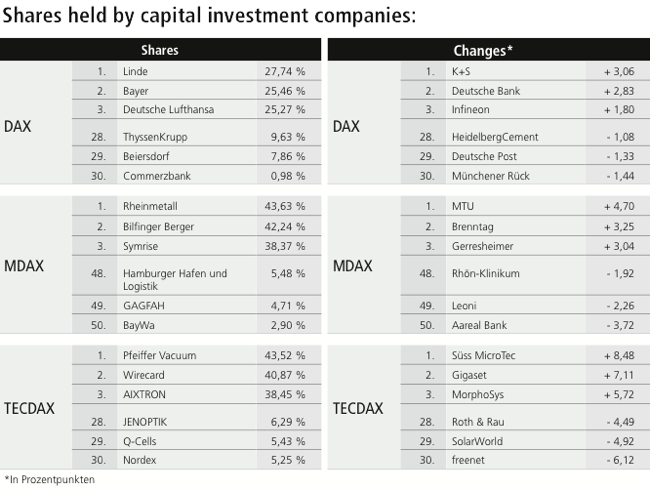
VIPsight Shareholder ID <click here>
Event Diary
Reading suggestions
Abeln, Christoph, Handbuch für Führungskräfte [Handbook for Managers]
Gabler Verlag, 240 pp, €39.95, ISBN 978-3-8349-2548-0
How do you deal with changes in the company? How should a manager act in restructuring, job modification or downgrading? A labour-law expert shows what to consider when a transfer or posting abroad or even a promotion to manager is proposed. Similarly, the central questions of compensation and the levers of variable compensation, company car and deferred compensation are explained in practically relevant terms. Checklists and concrete examples make the labour-law knowledge directly applicable in one’s own interest.
Bennemann, Christoph, Oehlenberg, Lutz, and Stahl, Gerhard (eds), Handbuch Solvency II [Solvency II Handbook]
Schaeffer-Poeschel Verlag, 304 pp, €99.95, ISBN 978-3-7910-2430-1
Solvency II is a quantum leap in the European supervision of insurance companies. This volume brings together authors from companies and oversight who have in recent years worked actively in the implementation of Solvency II. In over a dozen contributions the main issues associated with Solvency II are discussed.
Eyer, Eckhard, and Haussmann, Thomas, Zielvereinbarung und variable Vergütung [Goal setting and variable remuneration]
Gabler Verlag, 5th Edition, 200 pp, €44.95, ISBN 978-3-8349-2489-6
The book shows step by step how to link target systems and target setting to variable compensation, whether for individuals or for teams. In particular, the authors treat the goal-setting discussion in detail. A good, compact guide with many checklists, tips and current information sources.
Hannemann, Ralf, and Schneider, Andreas, Mindestanforderungen an das Risikomanagement (MaRisk) [Minimum Requirements for Risk Management (MaRisk)]
Schaeffer-Poeschel Verlag, 3rd Edition, 1178 pp, €129.95, ISBN 978-3-7910-2952-8
The authors comment on the regulatory purpose, illuminate the creative freedom and provide practical information for proper implementation in credit and financial-services institutions. In addition, they explain the new requirements on compensation systems, regulated since October 2010 in the banking compensation regulation.
Heesen, Bernd, and Gruber, Wolf, Bilanzanalyse und Kennzahlen [Balance-sheet analysis and indicators]
Gabler Verlag, 3rd Edition, 295 pp, €49.95, ISBN 978-3-8349-3076-7
Much of the profit-and-loss account or the balance sheet is really obvious, though not at first glance. At the international level, moreover, the total-cost method becomes less important, but for the German Mittelstand [SMEs], the total-cost method is clearly the best, because strengths and weaknesses and legal ability to intervene in the balance are easily seen here, for both the controller and the accountant. The work presents the legal position before and after the BilMoG.
Heyd , Professor Reinhard, and Beyer, Michael (eds), Die Prinzipal-Agenten-Theorie in der Finanzwirtschaft [Principal-agent theory in finance]
Erich Schmidt Verlag, 272 pp, €49.95, ISBN 978-3-503-12299-1
In this work, edited by Reinhard Heydrich and Michael Beyer, experts explore the tension between owners and managers in the financial industry anew. Based on principal-agent theory, they give valuable solutions to many current problems of the sector, such as the banking stress tests, the reorganization of accounting rules for financial instruments, corporate-governance reporting and the risk-based audit approach in the SME sector.
Reifen, Thomas (ed.), Finanzielle Restrukturierung Sanierung von Unternehmenskrediten durch Debt Equity Swaps und Treuhandlösungen [Financial restructuring – restructuring of corporate debt through debt-equity swaps and trust solutions]
Schaeffer-Poeschel Verlag, 317 pp, €79.95, ISBN 978-3-7910-3054-8
This practical textbook analyses, on the basis of business financing methods such as mezzanine and leveraged buyouts as well of as the role of the CLO markets, the causes of the financial restructuring of companies. Using a variety of examples, current debt-restructuring approaches such as debt-equity swap, trust models, and other loan-to-own strategies are identified. The author is director of corporate finance at Deloitte & Touche.















